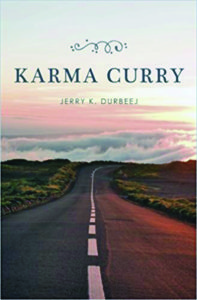By Petamber Persaud
“Derailed” could be an appropriate subtitle to the novel, “Karma Curry”, because evil plots, machinations and schemes are derailed, in the world of humankind, and in the sphere of the gods, even many good intentions are derailed and, also, the world of the author does not escape slices of derailment.
In this novel, the world of the immortal and the world of mortal feed off each other for survival, a novel approach to storytelling.
“Karma Curry” is about love, lust, betrayal, unrequited love, filial responsibility, revenge, remorse and atonement. “Karma Curry” is about reaping what you sow through how your actions in previous lives affect your current life. “Karma Curry” is, on one hand, about the continuation of tradition and, on the other hand, the challenging and breaking of tradition. This conflict is sustained throughout the lives of each main player and throughout the novel and it is this conflict that accounts for the novel been a cut above novels exploring similar themes.
The main story of “Karma Curry” is centred on the life of Karam Mohandas – his formative days in Guyana, growing pains, youthful tryst with love and lusting, his weaknesses, cowardice and failures – and his life in America, a failed attempt to outrun his fate, ending in suicide on his way home, by way of deportation. In the novel, suicide seems to be the only way out of predicaments as many players either prefer or contemplate that method of ‘solution’.
The other main character of the novel, in the humankind world, is Priya Etwaroo who is abandoned in Guyana by Karam and who eventually finds herself in America where the denouement of the story occurs, about four years after the man had escaped to that country. The other woman who suffers similar fate at the caprice of Karam is Gaitri Kumar who, in a series of coincidences, also finds herself in America. The Guyana chapter on those two is documented, but nothing else is known about either women until they arrival in America, seeking revenge and plotting the downfall of Karam. (There are, at least, two other women who could have reported Karam’s illegal status, namely Asha and Elizabeth.)
All of the above machinations are directed and misdirected by gods and goddesses whose sphere is replete with similar characteristics displayed in mortals, even names and events share characteristics. For instance, in ‘Brahmjoog’, where there is an appearance of democracy, the reader encounters places like ‘Bacradom’ where the ‘tribes’ have the freedom of choice, ‘Jhaiberia’ – a place for re-indoctrination and the ‘dreaded Bhundstapo’. This subplot is intriguing where there is jockeying among the gods and goddesses for position in the hierarchy and where there is at least one subcommittee which is male dominated. The author does an admirable job at parodying the sphere of gods and goddesses, leaving the reader with questions.
The novel unfolds in a series of stories within stories showing an influence from the great Indian texts like the Puranas and Mahabharata but in the novel each character is introduced with a sometimes too detailed backstory. This has two effects in that it slows the action and decrees the suspense with foreshadowing of the end – a bad end to it all. However, these stories would make a great collection of linked short fiction.
Foreshadowing seems to be a favourite technique of the author. For instance, the pandit is always withholding, from the parties involved, information from his ‘readings’ when he ‘open book’; the said information to which the reader is privy. This brings into focus pitfalls of first novels where eager writers want to pack everything between two covers with over-description and over-explanation, leaving nothing to the imagination. Another distraction is head-hopping which works sometimes but this happens throughout the novel where the reader is given differing viewpoints by the parties involved to the same action/scene.
Despite these niggling distractions, the author redeems himself through some excellent writing in which he captures the nuances of life in the countryside of Guyana and its capital city, Georgetown, and the metropolis of New York. The author seems to be poking fun or having fun with societal norms with humour sneaking up on the reader. His eye for details and fluid use of language are endearing to the reader.
Readers and publishers would love this new (cosmic) approach to age-old and age-worn story patterns.
“Karma Curry” is a first novel by Jerry K. Durbeej, published 2017 by CreateSpace Independence Publishing Platform, North America.
Responses to this author telephone (592) 226-0065 or email: oraltradition2002@yahoo.com (Guyana Times Sunday Magazine)



